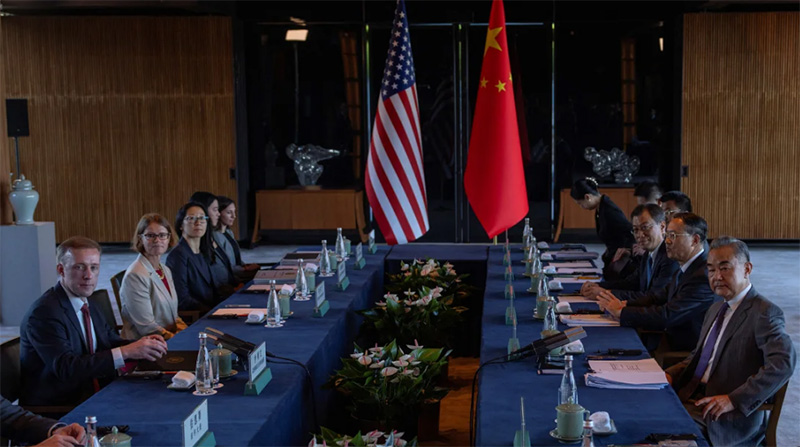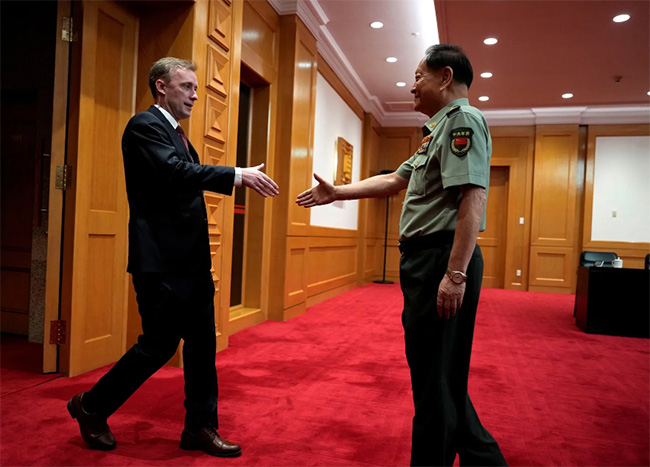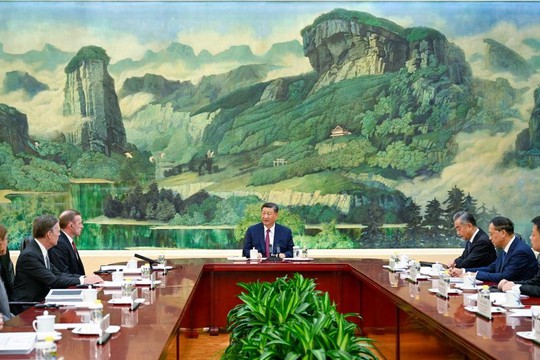Chinese President Xi Jinping meets with U.S. National Security Advisor Jake Sullivan at the Great Hall of the People in Beijing, capital of China, Aug. 29, 2024.
Photo: Xinhua
Chinese President Xi Jinping met with U.S. National Security Advisor Jake Sullivan at the Great Hall of the People here on Thursday, Xinhua informs.
Xi pointed out that in this changing and turbulent world, countries need solidarity and coordination, not division or confrontation. People want openness and progress, not exclusion or regress. As two major countries, China and the United States should be responsible for history, for the people and for the world, and should be a source of stability for world peace and a propeller for common development.
Xi stressed that when China and the United States, two major countries, engage with each other, the No. 1 issue is to develop a right strategic perception, and they need to first and foremost find a good answer to the overarching question: Are China and the United States rivals or partners?
Xi pointed out that China's U.S. policy is highly consistent. While great changes have taken place in the two countries and in China-U.S. relations, China's commitment to the goal of a stable, healthy and sustainable China-U.S. relationship remains unchanged, its principle in handling the relationship based on mutual respect, peaceful coexistence and win-win cooperation remains unchanged, its position of firmly safeguarding the country's sovereignty, security and development interests remains unchanged, and its efforts to carry forward the traditional friendship between the Chinese and American people remain unchanged, he said.
Xi expressed the hope that the United States will work in the same direction with China, view China and its development in a positive and rational light, see each other's development as an opportunity rather than a challenge, work with China to find a right way for China and the United States – two countries with different civilizations, systems and paths – to coexist in peace and achieve common development on this planet, and work to maintain the stability of China-U.S. relations and, on that basis, improve and take forward the relationship.
Sullivan conveyed the regards of President Joe Biden to President Xi, and thanked President Xi for meeting him. He said that since the San Francisco summit meeting between the two presidents, the two sides have earnestly implemented their common understandings and achieved positive progress. This round of strategic communication in China was in-depth, candid, substantive and constructive.
He reiterated that the United States does not seek a new Cold War, it does not seek to change China's system, the revitalization of U.S. alliances is not against China, the United States does not support "Taiwan independence," and it does not seek conflict with China. The one-China policy of the United States has not changed, and it has no intention to use Taiwan as a tool to contain China.
The United States hopes to maintain strategic communication with China and find a way for the United States and China to coexist in peace and for U.S.-China relations to develop in a sustainable way. President Biden looks forward to having communication again with President Xi soon, Sullivan added.
 Photo: CNN
Photo: CNN
The United States and China agreed Wednesday to more military talks and a call between the two countries’ leaders, after two days of talks between U.S. national security adviser Jake Sullivan and top Chinese diplomat Wang Yi (photo), aimed at preventing the difficult relationship from veering into conflict.
A call between President Joe Biden and Chinese leader Xi Jinping will be planned in coming weeks, as part of an effort to keep lines of communication open, according to a readout from the White House.
Jake Sullivan, making the first such trip by someone in his role since 2016, and Chinese top diplomat Wang Yi met in Beijing for talks that were meant to smooth over relations.
But after their meeting, state media reported that Wang cautioned Washington against supporting the Philippines in the disputed South China Sea.
“The United States must not use bilateral treaties as an excuse to undermine China’s sovereignty and territorial integrity, nor should it support or condone the Philippines’ actions of infringement,” Wang told Sullivan, according to state broadcaster CCTV.
Sullivan, who is US President Joe Biden’s most senior security aide, doubled down on Washington’s pledges to defend its regional partners.
“Mr Sullivan reaffirmed the United States’ commitment to defending its Indo-Pacific allies,” the White House said in a readout of their meeting.
According to CCTV, Wang emphasised to Sullivan that “China is firmly committed to safeguarding its territorial sovereignty and maritime rights over the South China Sea islands”.
Wang stressed that Taiwan belonged to Beijing and that China will “certainly be unified”.
He told Sullivan that the US should “put into practice its commitment not to support Taiwan independence” and stop arming Taiwan, according to CCTV.
The White House said Sullivan “underscored the importance of maintaining peace and stability across the Taiwan Strait.”
The US and Chinese officials also discussed issues including Ukraine, the Middle East and the Korean Peninsula, both sides said.
Sullivan had “emphasized concerns” about China’s support for Russia’s defence industry during Moscow’s invasion of Ukraine, the White House said.
Wang countered that China was committed to “working towards a political solution to the Ukraine crisis” and warned Washington off imposing “illegal unilateral sanctions.”
The two agreed to advance areas of cooperation, such as counternarcotics and AI safety and risk – but, as expected, made little leeway on major frictions in the relationship, CNN informs.
Wang stressed the importance of US-China coexistence, while calling on the US to stop arming Taiwan and support China’s “reunification” with the island – a self-ruling democracy claimed by Beijing.
The top Chinese diplomat also called on the US to “stop suppressing China in the fields of economy, trade, and science and technology,” calling American concerns about China’s manufacturing overcapacity “an excuse for protectionism.”
Sullivan said the US would “continue to take necessary actions to prevent advanced US technologies from being used to undermine our national security” and expressed concern about China’s “unfair trade policies.”
Both sides agreed to hold video calls between military theater commanders at an “appropriate time,” Chinese state broadcaster CCTV said. Establishing that direct line of communication has been a priority for Washington as military tensions with China have spiked in the Taiwan Strait and the South China Sea.
Sullivan raised concerns about China’s “unfair trade policies” and Beijing’s support for Russia’s defense industrial base.
“The United States will continue to take necessary actions to prevent advanced U.S. technologies from being used to undermine our national security, without unduly limiting trade or investment,” he said, according to a readout.
Wang called on the United States to respect Beijing’s sovereignty claims and its political system. “The United States should stop suppressing China in economics, trade and science and technology,” CCTV reported him saying.
 Photo: Al Jazeera
Photo: Al Jazeera
Before meeting Xi, Sullivan had a rare discussion with a general considered by diplomats to be the president's key military adviser, Zhang Youxia, vice chairman of the Central Military Commission (photo). He also had extensive discussions with China's top diplomat, Wang Yi, on Tuesday and Wednesday, Reuters reports.
With Zhang, Sullivan pushed for enhanced working-level communications between the countries' militaries during what was the first meeting between Zhang and a Biden administration official.
"Your request for having this meeting with me demonstrates the value the U.S. government puts on military security and our military-to-military relationship," Zhang said as he greeted Sullivan.
Sullivan told Zhang that both countries had a responsibility to prevent competition from veering into conflict or confrontation.
"Given the state of the world and the need for us to responsibly manage U.S.-China relations, I think it's a very important meeting," he said.
The White House said Sullivan raised concerns about China's support for Russia's defence industrial base, as well as Taiwan and the South China Sea.
In his meeting with Zhang, a senior figure in China’s powerful Central Military Commission, Sullivan stressed “US commitment to freedom of navigation in the South China Sea” and “the importance of cross-Strait peace and stability,” in reference to Taiwan, according to a White House readout.
Sullivan also raised cyberspace, efforts to reach a ceasefire in the war in Gaza, and American concerns about what the US says is China’s support for Russia’s defense industrial base as it wages war on Ukraine.
In introductory remarks ahead of the meeting, which took place at Chinese military headquarters in Beijing, Sullivan acknowledged how “rare” it was to have such exchanges.
Zhang called on the United States to “correct its strategic understanding of China, return to a rational and pragmatic policy toward China, (and) earnestly respect China’s core interests,” citing Taiwan as the “core of China’s core interests,” according to a readout published in Chinese state media, CNN informs.
…China prefers to deal directly with the White House over the State Department, a legacy that traces back to the clandestine trips of national security adviser Henry Kissinger, which paved the way for the restoration of diplomatic relations in the 1970s, said Wu Xinbo, director of the Center for American Studies at Fudan University, for ‘The Washington Post’.
Even so, Wu added, there is little hope of major breakthroughs before Biden leaves office. “It’s not really realistic for there to be a new strategic framework or consensus,” he said.
read more in our Telegram-channel https://t.me/The_International_Affairs

 12:34 30.08.2024 •
12:34 30.08.2024 •























